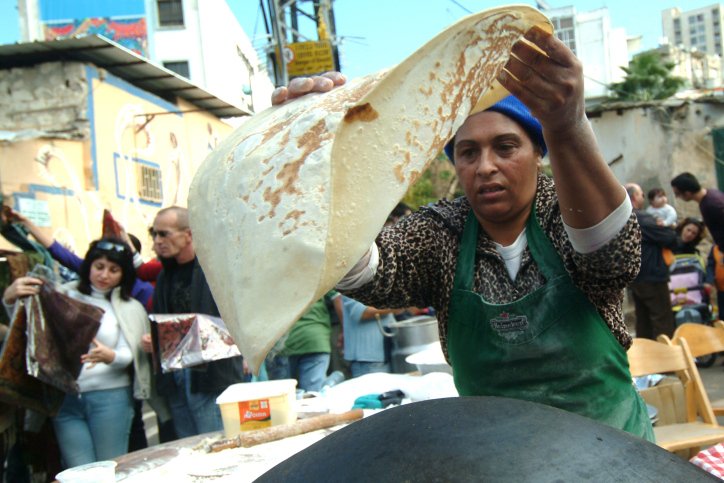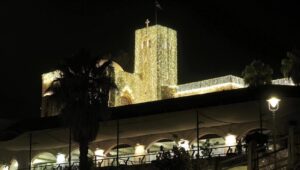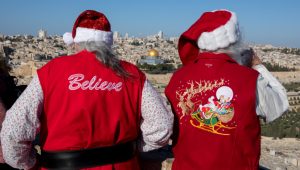Celebrating Christmas in the Muslim-majority Middle East is not easy. Even though this region is the cradle of Christianity from which the faith in Jesus spread to the whole world, and is home to the oldest Christian sects, some of which still speak Aramaic, and of course the Jews who still speak Hebrew, the languages that Jesus himself spoke, Christmas here has never been a “party.”
Of course Arab countries never acknowledged the Jewish component of the holiday, and not surprisingly, most Middle East Christians have adopted traditional European symbols to celebrate the birth of Christ in Bethlehem. Still, these brave Christians manage to celebrate some of light of Messiah in their own special way in the midst of a dark region dominated by conflicts and wars.
In Syria, for example, Christmas comes with fears and anxiety for Christians, and many of the traditional celebrations are canceled because of severe trauma the country is going through due to the sectarian and violent conflicts ravaging the people.
Statistics indicate an increase in the number of Christians leaving the Middle East because of their fear of being targeted, persecuted and killed. In countries like Iraq and Lebanon the difficult economic conditions may soon empty the Middle East of its local Christian residents.
Their Christmas Stories
We spoke with three young Christian women from Lebanon, Syria, and Jordan to find out why it is still important for them to celebrate Christmas and how they manage to maintain some of the joy of the season in the midst of all the troubles their people are experiencing under a Muslim controlled majority.
“Christmas is a very important time for my family, says Rasha Saad Al-Khoury from Lebanon. “When we were young we used to gather at my grandmother’s house with my brother, sister, parents, and the rest of my family, which was a very large number. Most of us lived in the same family building and we all had a very good relationship with each other.
“We start preparing for celebrations a month ahead of time. The building is lit up with decorations, and the Christmas tree is decorated with colorful ornaments that my mother and my aunts have been making by hand for several weeks.
“My mother also leaves a glass of milk and some biscuits for Santa Claus by the chimney and tells us he needs them to get some energy between his rounds. Later we all sit down to a big lunch with the family to eat the traditional holiday dishes of turkey stuffed with chestnuts and rice as the main dish with many Lebanese dishes alongside it like tabbouleh and some appetizers.
“Christmas is a celebration of generosity and joy, or at least this is our custom in Lebanon. My family canceled the Christmas celebration in the last two years after the death of two of my family members because of coronavirus unfortunately, though we still get together but without big celebrations. I think this is a testament to how important this celebration is to us in that instead of happy celebrations it was a time to express our love, sadness and sympathy.”
Carol Safadi from Syria says that “Christmas is a very warm and intimate time for me and my family. It is not only an important religious holiday, but it also means a lot to us because it is the time when family gets together. We usually start about three weeks before Christmas Day by decorating the tree. Churches around our house hold various Christmas events. I really enjoy taking my son to the arts and crafts event in the church where he makes his Christmas decorations.
“Mom and I also love going to the church market where they sell a lot of sweets and Christmas decorations and gifts. The church also puts on Christmas music and there are some food vendors selling sandwiches, crepes, etc. On Christmas Eve the family gathers for a delicious meal. We prefer to celebrate at home rather than go to a party in the restaurant. We enjoy turkey, appetizers, cheese, meat, and lots of wine and drinks. During Christmas dinner we open all the presents we got from each other, assuring my son that Santa Claus will bring him a special gift that he can open on Christmas Day.”
As for Somaya Ziadeh from Jordan, she says that “Christmas is still a fun occasion for us. I usually have dinner with my family on Christmas Eve, but we always invite our friends over to our house including my Muslim friends to eat the traditional food of this holiday we make with a local touch. And after dinner, one of my Muslim friends starts a party at his house so all celebrate together!”
There is something beautiful in these simple but precious expressions of faith among our Brothers and Sisters throughout the Middle East. We hope these brief stories of Christmas joy and light still shining in the darkness will brighten up your celebration this year.
Shalom, may you have a Merry Christmas and Happy New Year!














